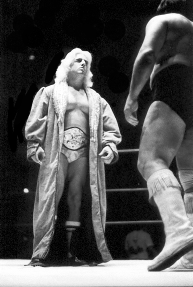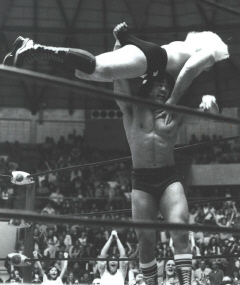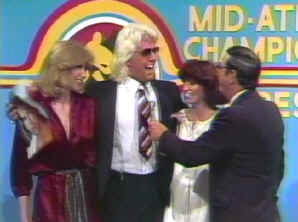|
PART
TWO
Chappell:
In the book around the sections
you talk about George Scott, you also
mention the late Johnny Valentine. He
was an early partner of yours. What a
tough guy in the ring, and one that a
lot of people who visit our website
remember well.
Flair:
Yeah, Johnny was a good guy.
Johnny was a strange guy, to be
honest. I can’t say that I didn’t
learn a little bit from him, because I
did. But his style was totally
different from what I wanted to do.
Chappell:
Totally mat based, that’s for
sure!
Flair:
Well, yeah, his style didn’t
work with anything I really wanted to
do.
I
came into the business watching Ray
Stevens and Pat Patterson, (Nick) Bockwinkle
and Red Bastien…and all of a sudden
I was down there watching John do his
thing.
I
really liked the Anderson’s style…
Chappell:
Really?
Flair:
Yeah, that worked a lot better for
me than John’s did.
But,
I was with John then, and it worked
out good. Because of the fact that I
was a young guy, and he was older and
more experienced.
It’s
kind of like what I’m doing now with
Randy (Orton) and Dave (Batista), you
know, in ‘Evolution.’
Chappell:
That’s right…in a lot of ways
you have come full-circle in your
career now with the WWE.
Flair:
A little similar, in some ways.
But,
I just wasn’t that enamored with
Johnny’s style of work.
I
mean, I appreciated how hard he and
Wahoo fought. And they did fight…it
was a fight, not a wrestling match.
Chappell:
Oh boy…those were brutal!
Flair:
I appreciated all that, but I told
myself that I needed to be a more
colorful and more flamboyant guy that
flew around a little more than Johnny
did. He didn’t believe in ANY kind
of bumps at all…he didn’t like
going off his feet.
Chappell:
With John, you pretty much got
toe-to-toe slugfests…
Flair:
Yeah, you really did.
Chappell:
We all remember that Valentine was
in the plane with you that went down
in Wilmington in October of 1975. Of
course, Valentine was never able to
wrestle again after that.
There
is a whole chapter in the book devoted
to the plane crash. I know I was
riveted to that chapter, to the point
that I felt that I was in that plane
with you! That had to be terrifying
beyond anything imaginable?
Flair:
Is was a really harrowing
experience…thank you. It was a rough
deal.
Chappell:
Another wrestler you mention by
name in your Acknowledgments section
is the late Wahoo McDaniel. And, of
course, you’ve already mentioned him
several times this afternoon.
I
guess what the book really impressed
on me was how close you were to
him…going far beyond what we fans
saw and knew in the 70s…
Flair:
Yes, that’s most definitely the
truth.
Chappell:
Please share some of your thoughts
about the ‘Chief’ with us. I
think one of your best stories in the
book, is where Wahoo comes racing into
the hospital in Wilmington to check on
you after the 1975 plane crash, and
the hospital personnel tried to
restrain him, because you two were in
a heated feud then! They thought Wahoo
had come to the hospital to finish you
off! (laughs)
Flair:
Yeah, exactly, that’s how
seriously they took it back then.
Wahoo
was that kind of a guy; just a stand
up guy…take no sh*t from anybody
type of guy. And he lived that way
every minute of his life.
(laughs)
He didn’t take sh*t from
anybody…not the wrestlers, the
wrestling promoters, women, wives,
girlfriends…
Chappell:
(laughing) It didn’t matter…no
one was immune!

Flair
and Wahoo prepare to do battle in
Richmond in 1976.
Photo
courtesy Bill Janosik | MORE
PHOTOS
Flair:
You know, Wahoo was married six
times. If he didn’t like something
his wife was saying…he didn’t let
the door hit her on the ass on the way
out!
Chappell:
(laughing)
Flair:
He didn’t care…when he got up
in the morning he was gonna play golf
or he was gonna fish. He would do
whatever he was doing that afternoon,
and then he’d leave and go to work
and then he was gonna drink that
night, and come home late. He didn’t
care! (laughs)
But,
I mean, he was one of the most
competitive people I’ve ever known
in my life…
Chappell:
Interesting!
Flair:
He had to be the best at
everything he ever did. He was a
scratch golfer, and if they did that
kind of stuff back then, a world class
Bass fisherman. He loved all that
stuff, you know what I mean?
Chappell:
Yeah, I remember on some of his
Mid-Atlantic interviews his love of
golf and fishing would definitely come
out at times.
Flair:
He slept on a real bear rug…and
if you stayed in his apartment or his
house it had to be 60 degrees---it was
brutal!
Chappell:
(laughing)
Flair:
He was just a real Jeremiah
Johnson.
Chappell:
Wahoo McDaniel…the ‘Mountain
Man!’ Amazing!
Flair:
Yes…he really was.
Chappell:
Another wrestler you mention in
the book’s Acknowledgements, and a
great competitor in the ring, was
Ricky Steamboat.
Flair:
Yes.
Chappell:
I found it interesting in the
book, to find out that you were
actually the one that approached
George Scott and pushed to start that
program with Ricky in 1977. And we all
know how phenomenal that turned out!
Flair:
And you know, the older guys,
including Wahoo, weren’t too excited
about [Steamboat] coming along!
Chappell:
I’ve always been curious about
that. But, I can sort of see that
being the case.
Flair:
Yeah…it was.

Ricky
Steamboat holds Flair high overhead
during a 1978 battle in Kingsport, TN
(Photo
courtesy Dick Bourne)
Chappell:
In the book, I think you indicate
that Steamboat was the best ‘good
guy’ that you ever wrestled. And, of
course, Steamboat stayed a good guy
his entire career.
Flair:
In my entire life, he was…he was
fabulous.
Chappell:
And Steamboat ended up being your
first tag team partner when you turned
into a good guy yourself in 1979. Talk
about a ‘Dream Team’ pairing!
Flair:
Oh yeah…he was off the charts.
Chappell:
Another person you mention in your
Acknowledgements was Mid-Atlantic
announcer Bob Caudle. You said the ‘golden voices’ of
Bob Caudle, along with Gordon Solie and current
WWE announcer Jim Ross, ‘helped
provide the soundtrack of my life.’
Flair:
Yes…
Chappell:
Your mention of Bob Caudle got me to thinking about all the great
Mid-Atlantic television angles that
took place at the WRAL studios in
Raleigh, North Carolina, or wherever
you all were taping TV.

Flair
on the set of Mid-Atlantic Wrestling
with Bob Caudle and girls in 1978
A
couple of great ones are mentioned in
the book…one is from 1978 when you
suckered Steamboat in the ring and
rubbed his face raw on the mat and
floor. Then he comes back on another
show, and tears your clothes off you!
You
also mentioned the angle from early
1981 where Roddy Piper comes out and
presents you the NWA TV Title as a
sort of consolation prize, after
he’s beaten you for the U.S. Title.
You turn the interview around on him,
exposing his winning the U.S. belt
from you with a foreign object!
Flair:
(laughs)
Chappell:
Any other Mid-Atlantic television
memories stand out to you?
Flair:
We did a lot of great stuff at WRAL.
The angle with Blackjack Mulligan
was huge…where I took his Cowboy hat
that Waylon Jennings had given him,
and tore it up and stomped on it. And
a little later on, I was wresting
somebody and Mulligan comes out
wearing my robe, and he tore up my
robe in front of me…
Chappell:
That was an unforgettable
Mid-Atlantic moment, Ric!
Flair:
And then I put a bounty out on
Mulligan. I left for Japan, and when I
came back, we were selling out
everywhere! (laughing)
Chappell:
And of course back then,
everything played off the weekly TV
show in your market. And that got the
fans out to their local arena. So
those TV angles like the Hat and Robe
were really, really important then.
There was hardly any cable TV and
certainly no satellite dishes in those
days. And Pay Per View events were
years off.
Flair:
Exactly. Oh yeah, they were
big-time.
Chappell:
You also mention in the book’s
Acknowledgements section Arn Anderson,
who you referred to as your ‘friend
for life.’
Arn
came in at the tail end of the
Mid-Atlantic promotion, and has been
closely associated with you through
Crockett, WCW and now to the present
with World Wrestling Entertainment.
Flair:
Arn came in during 1985, and was
with me there for a lot of the
Crockett days.
Chappell:
That was around the time that the
‘Four Horsemen’ came into being.
That time period is also well
chronicled in the book. It certainly
sounds like things with the Horsemen
were every bit as wild as what you all
were always telling us about on TV!
Flair:
(laughing) Yeah…they were! We
really had a lot of fun.
Chappell:
As the years go on, the book
describes the disintegration of Jim
Crockett Promotions in the late 1980s
in a lot of detail. For most
Mid-Atlantic fans, I think that
portion of your book will be a
fascinating, but a sad read.
You
describe how your relationship with
Jimmy Crockett, Jr. became more
distant, and there were really two
opposing camps…with Jimmy Crockett
and Dusty (Rhodes) on one side, and
you and
David
, Jackie and Frances Crockett on the
other.
Flair:
Yeah…
Chappell:
I think a lot of the fans that
visit our site will be very interested
in hearing how all that really did go
down.
Flair:
Well, you know, it went down
exactly the way that I wrote it!
I
tell you, to this day, I don’t know
how Jimmy and I drifted apart. He went
from being my best friend, a guy that
I thought the world of, to a guy that
I just couldn’t talk to. He was out
of control.
He
was convinced that they could go to
Dallas…which they lost a fortune.
And make movies. You know, that story
is very similar to the WCW story later
in the book.
Chappell:
How so?
Flair:
Well, not similar as to the way
Jimmy treated me, of course. Jimmy
Crockett never treated me badly at
all. But Jimmy and Dusty had an
obsession with trying to compete with
Vince
McMahon, and it overshadowed the
importance of making the territory do
well.
They
were so consumed with becoming a
national commodity, that they forgot
about their back yard. They spent
money they didn’t have,
continuously…which is very similar
to the WCW story.
Chappell:
And it sounded like by that time,
Jimmy would only listen to Dusty?
Flair:
No matter how many of us told
Jimmy that they were spending too much
money, it didn’t matter…
Chappell:
He didn’t want to hear it.
Flair:
Right. And we kept telling him he
should stay east of the
Mississippi…not go west of the
Mississippi. If he had done that, he
would have stayed in business.
But
the minute we went west, we started
losing big money.
Chappell:
And that situation is addressed in
depth in the book.
Flair:
(laughs) And you know who speaks
out very candidly about it, is
David
(Crockett)!
David
verifies everything I’m saying.
Chappell:
He does, and in fact
David
Crockett is quoted throughout the
book. I thought his insight on a lot
of subjects contributed significantly
to the book.
Flair:
Don
’t think that
David
didn’t seize the opportunity to tell
Dusty and Jimmy what he thinks of
them…
Chappell:
Oh yes!
Flair:
Until I read
David
’s quotes, I didn’t realize how
harsh he’d been either. He’s
harder on them than I am! And I’m
not really hard on them…
Chappell:
No, not to any great extent
certainly….
Flair:
The things that I’m talking
about there, probably hurt me more
than the guys that are reading it now.
|